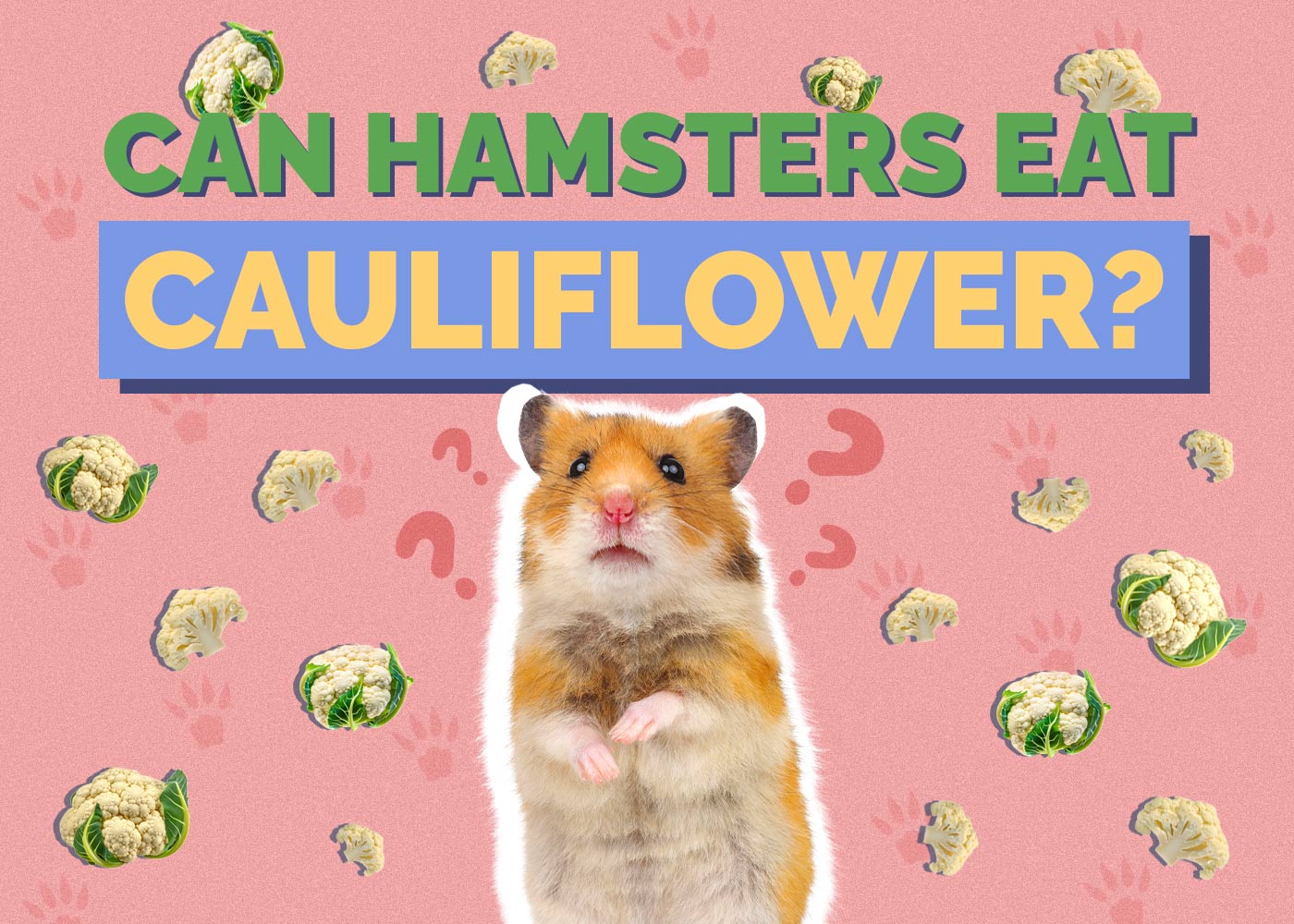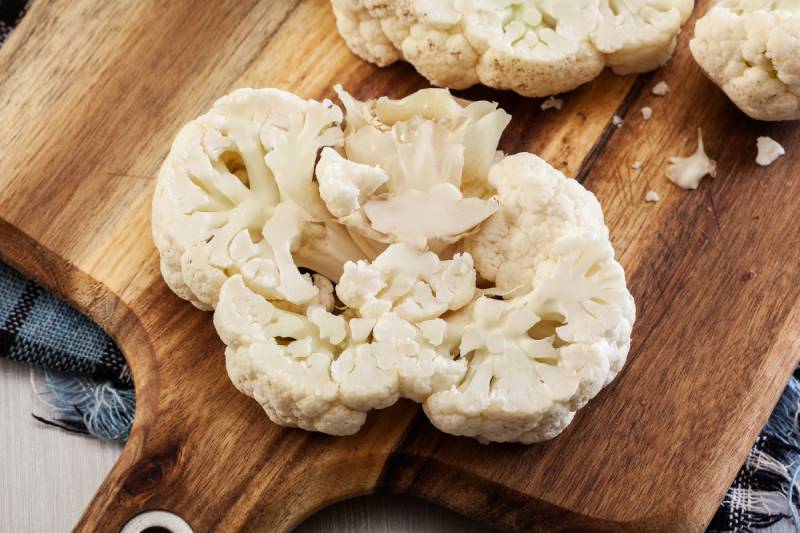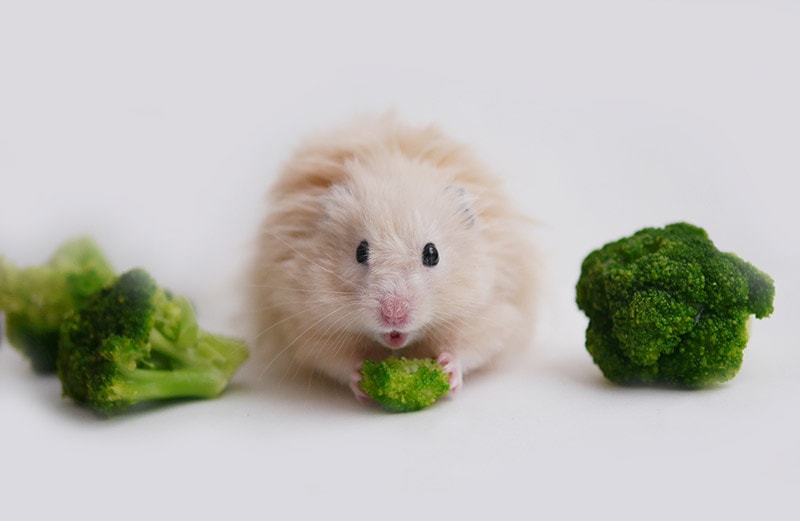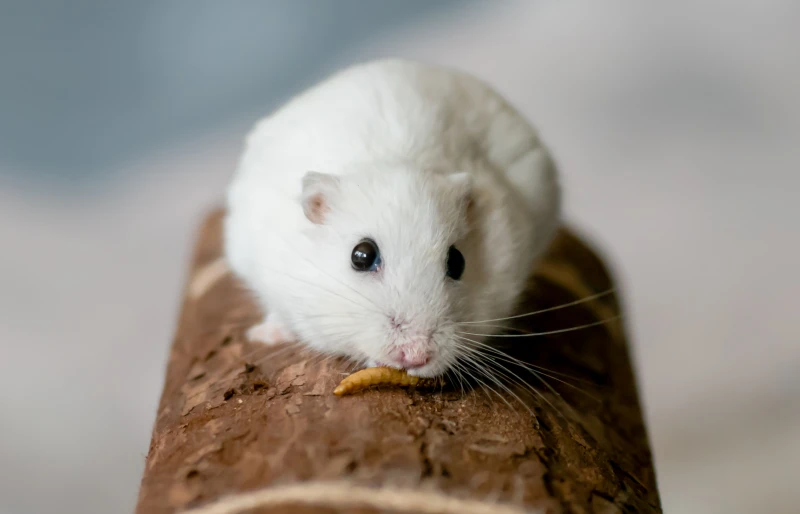Can Hamsters Eat Cauliflower? Vet Approved Facts & FAQ
Updated on

Hamsters are adorable little rodents that can make great household pets if they have a suitable habitat and plenty of attention and care to rely on. They enjoy exploring their surroundings, playing with toys, and eating a variety of different foods. All these things relate to their overall quality of life, so it makes sense to make sure that anything you feed your hamster is safe for them.
So, can hamsters safely eat cauliflower as part of their diet? Is cauliflower beneficial to their health? The short answer is that yes, hamsters can eat cauliflower. It can be a source of nutrients that hamsters need to stay healthy, and it has a nice texture that most hamsters seem to enjoy overall. Here is everything that you should know about feeding cauliflower to hamsters.
What Is Beneficial About Feeding Cauliflower to Hamsters?
Cauliflower is low in sugars and high in fiber, and both attributes are generally good for hamsters. Fiber helps keep their gastrointestinal system in good shape, while the lack of sugars helps ensure that they do not end up dealing with problems like obesity or diabetes. Cauliflower happens to be low in calories and fat, which means weight gain should not become a problem. The beneficial nutrients that cauliflower contains for hamsters include:
- Vitamin B6 — This is important for proper growth, luscious fur, and skin health.
- Protein — Cauliflower contains protein, like all plant foods do which is important for growth and reproduction in hamsters.
- Vitamin K — Such a nutrient helps protect against clotting problems, although hamsters get a lot of their vitamin K through coprophagy.
Cauliflower can be a great addition to your hamster’s overall diet. Hamsters tend to love the texture, and gnawing on a chunk of cauliflower can help keep them entertained during the day. This vegetable can be used as part of the overall diet and/or as a snack or treat.

What Should a Hamster’s Diet Look Like?
Hamsters are classified as omnivores, which means they must eat a mix of plant and animal proteins to get all the nutrients that they need for good health. Most of their diet in the wild is made up of plant foods, but they will feast on animal life like insects and worms to supplement their overall diet. They are notorious for hoarding their food and saving it for later, and as pets they do this too.
If your hamster is not finishing their dish of food whenever you provide them with a meal, there is a good chance that you’re feeding them too much. They could be moving food to “safe havens” in their habitat, where it might rot and make the habitat unsanitary without you knowing. So, it’s always important to make sure you’re not overfeeding your hamster at any given time.
You should also check the entirety of your hamster’s habitat every few days to make sure food isn’t being hoarded somewhere where it can go bad and become a danger to your pet.
- Commercial Hamster Pellets — This should be the mainstay of your hamsters diet. Avoid any muesli based diets as they allow a hamster to pick out only the bits it fancies eating; usually the sugary morsels! Commercial hamster pellets are usually made of grains, legumes, insect husks and are typically supplemented with vitamins and minerals formulated to meet the specific dietary needs of hamsters.
- Timothy Hay — Found in pet shops and feed shops, this type of hay is full of fiber and ideal for hamsters. It should be offered freely.
- Fresh vegetables and fruit — A small amount of fresh vegetables and fruits can be given to your hamster each day. Hamsters like to hold on to their food and move it around as they gnaw away, so cutting vegetables and fruits to a suitable size for your hamster makes it easier for them to chew on. Remember never to feed hamsters any citrus fruits.
- Snacks/Treats — Nuts, mealworms, and pieces of boiled egg are great treats to offer hamsters a few times through the week for added protein and enjoyment.
Cauliflower is a low-calorie food that offers plenty of nutrients that hamsters need for good health. Therefore, it can be offered to your hamster daily as a part of their regular diet. Feel free to add a chunk, a slice, or a few pieces of shredded cauliflower to your pet hamster’s dish at mealtime at least once a day if you have it on hand.
FAQ
What Other Types of Vegetables Can Hamsters Safely Eat?
Your pet hamster should have access to various vegetables as part of their diet, even if just as occasional snacks, to help ensure that all their dietary needs are met and that they don’t get bored with their meals. Here are great vegetables to consider offering:
- Chicory
- Spinach
- Broccoli
- Cabbage
- Cucumber
- Squash
Herbs also happen to pack a punch when it comes to keeping a hamster nutritionally healthy. Here are nutrient-rich options for owners to choose from:
- Sage
- Coriander
- Basil
- Parsley
Your hamster should eat a small amount of varied fruits, veggies and herbs daily, but quantity is key. Remember any fruits are high in sugars so these should be limited to only once or twice a week. The pellets and hay are the mainstay of your hamster’s diet, so we don’t want it to fill up on a piece of delicious carrot and then be too full to eat its pellets. Consult with your veterinarian to determine how much vegetable and fruit matter should be offered to your hamster each day.

Can Hamsters Safely Eat Fruit?
Hamsters can eat a bit of fruit as an occasional supplement to their diet. Keep in mind that fruit is high in sugar, so it can contribute to problems like weight gain if it’s offered too often. Fruits that your hamster may enjoy as a supplemental treat include:
- Berries
- Apples
- Pears
- Peaches
- Bananas
- Melons
Final Comments
Hamsters can eat a wide variety of veggies and a few fruits. Cauliflower is one of those foods that are perfect for hamsters. It is low in calories and high in nutrients and provides extra texture for your hamster to enjoy during meal and snack time.
See Also:
- Can Hamsters Eat Mushrooms? Vet-Reviewed Nutrition Facts
- Can Hamsters Eat Cat Food? Vet-Approved Nutrition Guide
Featured Image Credit: Lisa Mar, Shutterstock












